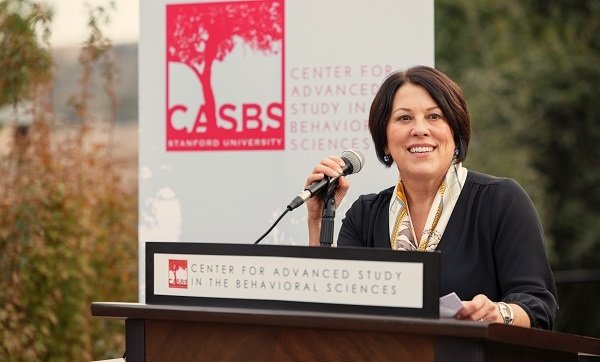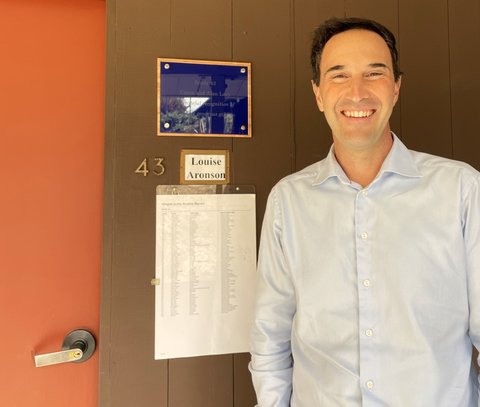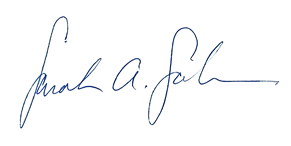Greetings, Friends!
I write this letter after concluding my first year as CASBS director, and am pleased to report that the year was a great success. Most fellows say that they have been productive and (more importantly), learned a lot from other fellows and appreciated being in our interdisciplinary setting. Many feel that slowing down and thinking deeply has been a gift, and several have used terms like “healing” and “restoration” to describe how their fellowship year has gone. Not surprisingly, and without exception, they wish that their time here had not passed so quickly. All of this leads me to conclude that we delivered a transformative experience to them.

We organized some enriching activities for fellows to enhance that experience. For example, we hosted a joint reception and hike to bring John S. Knight journalism fellows and Distinguished Career Institute fellows, both based at Stanford, in interaction with our fellows. In addition, based on a need that fellows expressed, we organized a writing workshop in which we brought in a professional writing coach to offer guidance. Also at their request, I organized a series of daytime talks for the fellows revolving around the “Magic and Mystery of Silicon Valley.” These involved notable Silicon Valley leaders and practitioners and some of our faculty fellows, engaging topics such as people analytics, innovation, and AI policy. Alongside these special initiatives, communications director Mike Gaetani again organized our annual series of visits with academic and trade book publishers and editors, literary agents, as well as the ninth installation of our popular op-ed writing workshop.
On the research programs side of the house, this was a quiet year in which we wound down projects that former CASBS director Margaret Levi spearheaded and started to design and seek funding for a set of new programs. Next year, for example, CASBS will host a program funded by the Stanford Center for Longevity led by Stanford professors Mitchell Stevens (GSE) and Professor Laura Carstensen (a 2009-10 CASBS fellow) on Education and Learning for Longer Lives. Both will serve as CASBS faculty fellows in 2024-25. We also will host a program in collaboration with the Stanford Doerr School on Transformation Science for Sustainability. We’ll share details on both soon.
We hosted a number of intellectually and socially stimulating community events this year. Among them was a gathering for CASBS board chair Abby Smith Rumsey’s book, Memory, Edited: Taking Liberties with History, audio-recorded live and later released as a podcast episode; the public 2023 Sage-CASBS Award Lecture, featuring winners Elizabeth Anderson and Alondra Nelson; the first of what we’re calling convenings of “CASBS Muses,” in which we bring a few former fellows in residence here for a couple of days – in this case, Marion Fourcade (2008-09), Ruth Milkman (2018-19), and Fred Turner (2007-08, 2014-15) – orient them around a theme for a panel discussion and office hours with current fellows; and another book event, this time with CASBS faculty fellow and Stanford Medicine luminary Abraham Verghese, who shared fascinating behind-the-scenes stories relating to the writing of his novel The Covenant of Water, read a few short excerpts from the book, and fielded questions from attendees. (View a photo in CASBS’s spring 2024 newsletter.)

I’ve said before that one of the Center’s greatest assets is our alumni base. We experimented this year with ways to build deeper connections with former fellows. As mentioned above (and in my letter in the fall 2023 newsletter), with the generous support of board member Chien Lee, we hosted our inaugural CASBS Muses event. We’ve also begun a quiet but concerted campaign to document visits from past fellows, while also doing everything we can to host them as special guests. In recent months, I and other staff have welcomed at least 25 former fellows for lunch and visits, each time bringing them to the study they occupied to take photos! These photos usually find their way to CASBS social media, as you may have noticed. And those are just the ones we know about, since fellows often independently invite former fellows as guests too. Here I show just one special example – my Stanford Graduate School of Business colleague and friend, Jonathan Levin, recently appointed as Stanford’s next president. Fun fact: Jon was a CASBS fellow in 2007-08 and, yes, occupied study #43!
Former fellows mostly come to us, but we’re delighted to go to them when circumstances allow. Deputy director Sally Schroeder and I now make a point to set up informal reunions and meetings with alumni whenever we travel for CASBS. Last year, for example, when we traveled to Amsterdam for the annual meeting of “Some Institutes for Advanced Study” (SIAS), we met up with former fellows Anita Hardon (2019-20), Kiki Lombarts (2020-21), Batja Mesquita (2016-17), and Will Tiemiejer (2016-17). We’ll do the same for this year’s SIAS meeting in Boston, hosting a breakfast for nearby former fellows. In April, when we were in Venice on Center business (I love this job!), we connected with former fellow Marco Casari (2019-20). (Here, too, photos of such reunions often find their way to CASBS social media.)
This is the kind of extended CASBS community I want to create. Between gatherings on the hill and traveling away from it, I have been intentional about consulting with and bringing in former fellows to various conversations and events because I’m convinced that the more connected people feel to CASBS, the better we will be overall as an institution.
And to extend our community still further, I constantly seek to connect with people outside our alumni base who may be interested in what CASBS is and does. In recent months, for example, I’ve been delighted to host Guido Imbens, a Nobel Prize-winning economist nearby at Stanford; Shankar Vedantam, the journalist widely known as the host of the radio program and podcast Hidden Brain; and Michael Lewis, the acclaimed author who wrote about key work that 1977-78 fellow Daniel Kahneman conducted here (with collaborator Amos Tversky – himself a 1970-71 CASBS fellow ) in his book The Undoing Project but who never had visited the spot where it happened. (See a photo of Michael in our special tribute to Daniel Kahneman.)
As I reflect on this year, I do so with gratitude and admiration for this 70-year-strong institution that has had such a profound impact on the social and behavioral sciences and on many scholars who, as CASBS fellows, research affiliates, and visiting scholars, in turn have been integral to projecting and enhancing its stature in the world. It has been an exciting and gratifying first year, and I greatly look forward to welcoming the 2024-25 fellows class to this special, transformational place.
Sincerely,

Bonus content: Sarah Soule appeared on the podcast Grit & Growth to discuss building and maintaining a high-performing team culture. Listen here.
